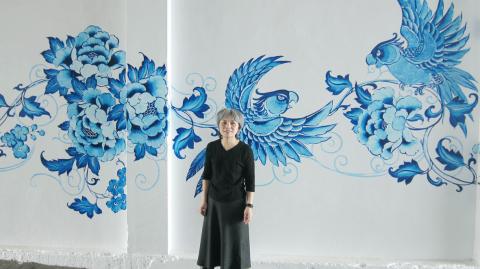|
Ceramic artists continue service trade pact protests
By Liu Yan-fu and Stacy Hsu / Staff reporter, with staff writer

Internationally renowned ceramic artist Lily Yang is pictured in front of a decorated wall at her studio in Yingge District, New Taipei City, on Saturday.
Photo: Liu Yen-fu, Taipei Times
Ceramic artists in New Taipei City’s Yingge District (鶯歌) accused the government of keeping them in the dark about the controversial cross-strait service trade pact’s potential effect on their livelihood as the final public hearing on the pact is due to begin today.
Yingge has been the nation’s largest center for ceramics production since Chinese potter Wu An (吳鞍) established a kiln plant in the area in 1804.
According to data provided by the New Taipei City’s Economic Development Department, there are about 300 ceramic stores in the district that generate a total of almost NT$3.3 billion (US$110 million) in annual revenue.
The data also showed that visitors to the Yingge Old Street (鶯歌陶瓷老街) spent approximately NT$1.3 billion last year.
Yingge Ceramic Art Promotion Association director-general Hsu Shu-chen (徐淑真) said the district’s flagship industry produced a wide range of ceramics that could be used in everyday life or as architecture material and decorative art.
Ceramics has been the center of residents’ lives and the sole reason why tourists have come to Yingge, Hsu said.
“However, the government has unilaterally decided to open the nation’s door to Chinese business, even though it has not told us how the pact is going to affect the industry,” Hsu said.
“If products made in China’s famous porcelain capital, Jingdezhen, are allowed to enter the Taiwanese market, there is no doubt that every ceramics shop in Yingge will go out of business,” Hsu said.
Economic Development Department Director Yeh Hui-ching (葉惠青) said the city government has tried to transform the industry by helping it incorporate more creativity in its products and explore the international market.
“Such endeavors help increase the industry’s competitiveness, regardless of the cross-strait agreement’s impacts,” Yeh said.
Lily Yang (楊莉莉), one of Taiwan’s best-known porcelain artists, said Yingge ceramics could become history if Chinese investors were allowed to establish kilns in the country.
“All they need to do to stop tourists from coming to Yingge is set up the kilns somewhere else, such as in Taipei or Taoyuan County,” Yang said.
Academia Sinica associate research fellow Huang Kuo-chang (黃國昌) said the most terrifying part about the agreement was not the government’s lack of communication with concerned industries, but the its failure to properly evaluate industries’ wellbeing.
“If the government let the legislature review the treaty without giving a clear picture of the nation’s industrial structure, it would be doing the opposite of what it is supposed to do, which is to facilitate the development of distinctive local industries,” Huang said.
The service trade agreement, which was signed in June last year, has been stalled in the legislature because of objections from opposition lawmakers, who are concerned that it could harm the nation’s interests.
source: Taipei Times
|